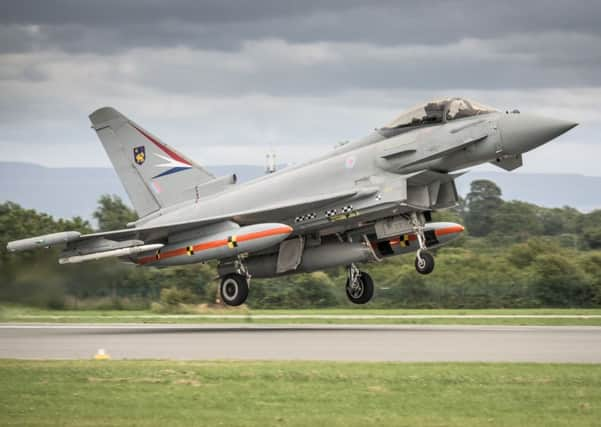UPDATED: Union warning as BAE Systems axes 371 Lancashire jobs


BAE said the job losses would affect its 10,000-strong workforce in Samlesbury and Warton, which makes the Eurofighter Typhoon.
It is proposed to cut 343 roles at Samlesbury and 28 at Warton.
The company said it hoped to avoid compulsory job losses.
Advertisement
Hide AdAdvertisement
Hide AdToday a Unite union official warned BAE that “cutting too far, too fast” could led to a skills shortage when orders pick up.
BAE Systems makes the Typhoon and the Hawk trainer jet at its sites at Samlesbury and Warton and also parts of the American F-35.
The group warned that the move to slow jet production would hit its 2015 financial results and will see Typhoon production sales drop from around £1.3 billion in 2015 to around £1.1 billion in 2016.
In a letter to employees, the company said: “Today we have also announced action to extend the production life of Typhoon aircraft by reducing the current production rate in our UK Military Air and Information (MAI) business and to respond to the absence of additional near-term shipbuilding work at our Williamstown shipyard in Australia.
Advertisement
Hide AdAdvertisement
Hide Ad“Both of these actions will regrettably result in some workforce reductions. While we do not take decisions that impact our workforce lightly, these actions are vital to enhance our competitive position and ensure we have a long-term sustainable business.”
Meanwhile, the company announced today it had sold 22 Hawk advanced jet trainer aircraft, associated ground equipment and training aids to the Royal Saudi Air Force.
BAE Systems chiefs recently said there were enough Typhoon orders to last until 2018, although that could be extended.
New enhanced weapons systems have also been tested and are expected to be rolled out on the Typhoon in the near future.
Advertisement
Hide AdAdvertisement
Hide AdChris Boardman, Managing Director, BAE Systems Military Air & Information, said: “We appreciate this is difficult news and we will work closely and openly with the Trade Unions, employee representatives and employees, to ensure the best possible outcome for the individuals affected and the MAI business.
“We understand this announcement creates uncertainty and concern, but we believe that taking action now will put us in the best possible position to secure future work and help ensure we have a long-term sustainable business.
The company added in its letter to employees; “Although there can be no certainty as to the timing of orders, we are confident that Typhoon will achieve further export success in the months ahead. This is reinforced by the recent agreement reached with the Kuwait Air Force for 28 aircraft.
“Subject to the formal contract, deliveries from the Italian Typhoon final assembly line to Kuwait involve an extended production schedule and are likely to commence around the end of the decade.
Advertisement
Hide AdAdvertisement
Hide Ad“To meet existing and anticipated orders and delivery schedules, we have decided to reduce the rate of Typhoon production from early next year to enable us to bid competitively for new orders. This action will avoid any break in production and provide a more sustainable and competitive position for Typhoon manufacturing in the years ahead.
“We will explore opportunities to mitigate compulsory job losses in line with our policy and usual practice.“
Unite union national officer Ian Waddell said: “This is disappointing news on top of a miserable few weeks for manufacturing in the UK. The Government needs to stop dithering and act urgently to stop the haemorrhage of skilled UK manufacturing jobs.
“The Typhoon is a superb aircraft, but it faces tough competition in the export market. It is vital that critical skills and capability are maintained by BAE Systems and their supply chain so that the ability to build the Typhoon in the UK is protected. Cutting too far, too fast could led to a skills shortage for when orders pick up.